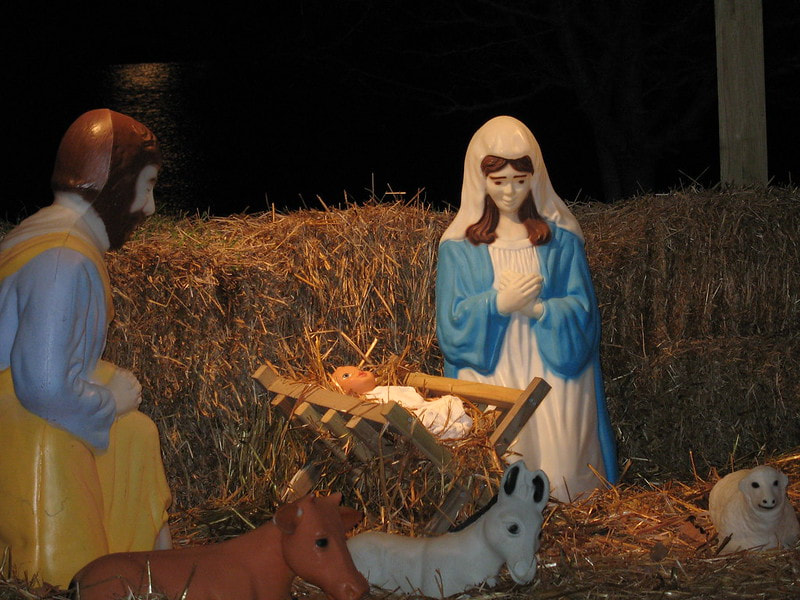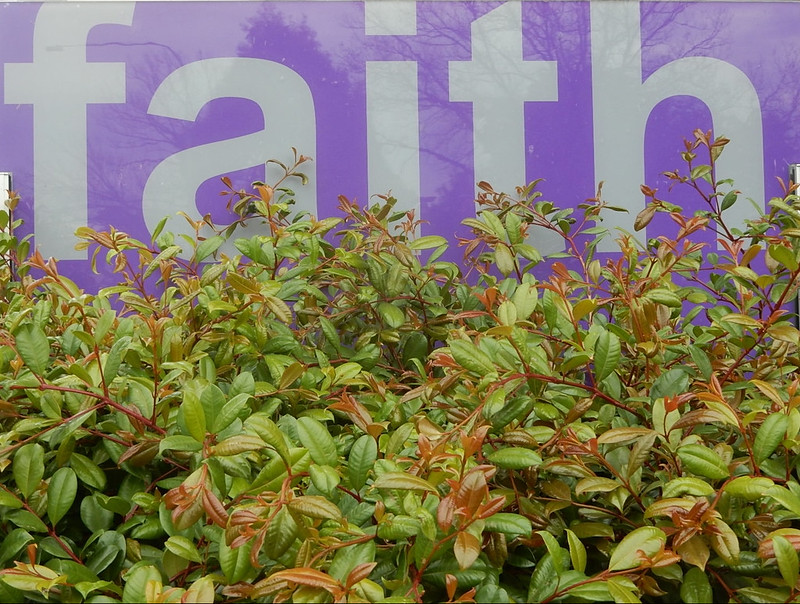|
"O come to my heart, Lord Jesus—there is room in my heart for Thee!" This refrain from the song "Thou Didst Leave Thy Throne" (written by Emily Elliott for her father's church, St. Mark's Anglican Church of Brighton, England) gives one the opportunity to personalize their commitment to Jesus. The verses tell the story of the birth, life, death, and victorious return of our Savior. The first four verses use the word "but" to contrast the differences between heaven's actions and earth's response. The final verse rejoices at Christ's return to bring us to His side. He makes room for us at His side as we make room for Him in our hearts.
Below are the words to the song. As you read them, pay attention to what comes after the "but." "Though didst leave Thy throne and Thy kingly crown when Thou camest to earth for me; but in Bethlehem's home was there found no room for Thy holy nativity.* Heaven's arches rang when the angels sang, proclaiming Thy royal degree; but of lowly birth didst Thou come to earth, and in great humility.* The foxes found rest, and the birds their nest in the shade of the forest tree; but Thy couch was the sod, O Thou Son of God, in the deserts of Galilee.* Thou camest, O Lord, with the living word that should set Thy people free; but with mocking scorn and with crown of thorn they bore Thee to Calvary.* When the heav'ns shall ring and the angels sing at Thy coming to victory, let Thy voice call me home, saying, 'Yet there is room—there is room at My side for thee,' My heart shall rejoice, Lord Jesus, when thou comest and callest for me!"* * "O come to my heart, Lord Jesus—there is room in my heart for Thee!" The world found no room for the Christ child who came in great humility even though He is a king and a priest. He was crucified wearing a crown of thorns, but death could not keep Him down. All of heaven proclaims that one day our Lord will return in victory. Here is what we must consider: Do we have room for our Savior in our hearts? Last year prophet Shawn Bolz put a beautiful new year prayer on Instagram. The first few sentences are the best, in my opinion. "God, I give you my most precious commodity you have given me this side of eternity. I give you space to create more of Yourself in me. I commit to daily time with you to develop our deep connection. I open my heart to you and listen with hungry ears. I will look for you in my days." As we welcome in the New Year, let's make it our goal to invite the Holy Spirit of Jesus to take more space in our hearts so that we become more like Him. Paul explains how Jesus emptied Himself of His glory in obedience to Father God. "He existed in the form of God, yet He gave no thought to seizing equality with God as His supreme prize. Instead, He emptied Himself of His outward glory by reducing Himself to the form of a lowly servant. He became human." (Philippians 2:6-7 - TPT) Consider what Jesus told the Jews who were questioning Him about His testimony. "Now a slave has no permanent place in the family, but a son belongs to it forever. So if the Son sets you free, you will be free indeed. I know that you are Abraham's descendants. Yet you are looking for a way to kill me, because you have no room for My Word." (John 8:35-37) The Word is filled with truth, wisdom, and power. The Word is our Lord. What better way to make room in our hearts for Jesus than through spending time in the Word. Jesus is ready to create more of Himself in us when we give Him room to do so. May 2022 be the year when we make more room in our hearts for the Lord! Sprinkled throughout the Old Testament are signs that point to Jesus, the Messiah. In the New Testament we see the fulfillment of these words. Some of the most astonishing words were spoken to the shepherds in the fields near Bethlehem. "For there is born to you this day in the city of David a Savior, who is Christ the Lord. And this will be a sign to you: You will find a Babe wrapped in swaddling cloths, lying in a manger." (Luke 2:11-12 - NKJ) Seven hundred years before the birth of Jesus the prophet Micah made two statements that pointed directly to the Savior and the places that would be impacted by His birth. "As for you, watchtower of the flock (Migdal Eder), stronghold of Daughter of Zion, the former dominion will be restored to you; kingship will come to Daughter Jerusalem." (Micah 4:8) "But you, Bethlehem Ephrathah, though you are small among the clans of Judah, out of you will come for me one who will be ruler over Israel, whose origins are from of old, from ancient times." (Micah 5:2)
Is it not fitting that Joseph and Mary had to travel to Bethlehem (Joseph's hometown) to register for the census that was being taken? As they neared Bethlehem, they would have passed Migdal Eder (The Tower of the Flock) which sat in the middle of the six miles between Bethlehem and Jerusalem. There were special sheepherders, called Levitical Shepherds, at this location. They would have come from the tribe of Levi and were chosen and trained to care for the flock of sheep that produced the sacrificial lambs for the Temple. The Tower had two levels and two purposes. Midgal Eder was initially used as a military tower to defend Bethlehem. The shepherds used the second story as a watch tower to look out for the sheep and protect them from predators and wild animals. The first story of the Tower had another purpose. Shepherds would bring the pregnant ewes into the Tower for birthing. Babies were swaddled at birth so that they did not harm themselves. Then they were laid in a manger until they calmed down. One year-old male lambs would be herded to Jerusalem for Passover on a day called the Day of Lambs. Here the priests would inspect them and choose those without spot or blemish. During Passover, a lamb was needed for every household. Jenee Baldwin wrote in "The Dawson Creek Mirror" on December 25, 2019, that 250,000 sheep would have been needed each year to accommodate Passover. Every firstborn male lamb was marked as holy and set aside for sacrifice. When born, only the lambs born at Migdal Eder would be wrapped in swaddling cloths and laid in a manger. The need for blood sacrifices came about in the Garden of Eden when Adam and Eve sinned. Blood was required to cover sin. A covenant was made with cutting and shedding of blood for life is in the blood. The flocks at Migdal Eder were considered sacred. They were meant to atone for sin and make peace with God. The birth, life, and death of Jesus is linked with the lambs destined for the Temple. He was born among the Temple flocks, wrapped in priestly cloths after being born in a stable, and placed in a manger (a feeding trough). Prophecy was fulfilled at His birth. He was a sign from God that the "Perfect Lamb of God" came to end animal sacrifices for He was the ultimate sacrifice. After the three-year ministry of Jesus was completed, the Lamb of God was nailed to a cross outside the walls of Jerusalem. His blood was spilled while the priests would have been slaughtering the Passover lambs. Jesus was born to die and restore our covenant with God. "And this will be a sign to you," the angel said to the shepherds. The sign still speaks to us today! Jesus came to give us everlasting life. John the Baptist called it out: "Look, the Lamb of God, who takes away the sin of the world." (John 1:29) Our celebration of Christmas is intertwined with Passover. God's gift to us is one that keeps on giving. Eternal life has been imparted to us who accept and believe and receive the Sign. Shepherd and author Phillip Killer gives us insight into the basic tools of the shepherd in the Middle East. In his book, A Shepherd Looks at Psalm 23, he shares how he used to watch the African herdsmen tending their sheep with only a "long slender stick and a rough knob-kerrie." (A short stick with a knob at the top) Shepherds in the making take immense pride in selecting their first rod and staff. A young sapling is selected to be carved and whittled down. The enlarged base of the sapling is shaped to fit perfectly in its owner's hand.
Phillip Keller says about the rod: "It is an extension of the owner's own right arm. It stood as a symbol of his strength, his power, his authority in any serious situation. The rod was what he relied on to safeguard both himself and his flock in danger. And it is, furthermore, the instrument he used to discipline and correct any wayward sheep that insisted on wandering away." Remember how Moses was called out of shepherding sheep by God to confront Pharaoh? He used his shepherd's rod to demonstrate the power of God. Miracles were manifest not only to convince Pharaoh of God's purpose for His people but also as a tool of reassurance for them. Ultimately, Moses shepherded God's flock out of Egypt. Psalm 23:4 explains that our Good Shepherd uses His rod and staff to comfort us. Comfort comes as we realize that the rod of God is an extension of the Shepherd. Jesus, our Messiah, the Word of God, is God's rod. Messiah came as the Word of God. This is explained in John 1:1-2 and 14. “In the beginning was the Word, and the Word was with God, and the Word was God. He was with God in the beginning. The Word became flesh and made His dwelling among us..." As the Rod of God, Jesus is an extension of who God is. This was prophesied by the prophet Isaiah. "A shoot (rod) will come up from the stump of Jesse; from his roots a Branch will bear fruit. The Spirit of the Lord will rest on Him..." (Isaiah 11:1-2) Based on John 1, Scriptures are God's rod, "an extension of His mind and will and intentions to mortal man," according to Phillip Keller. We are kept in the comfort of the flock of the Lord through the Shepherd's rod. We are disciplined with this same tool. The Word of God should come swiftly to correct us and keep us walking in the right direction. Another interesting use of the Word is referred to in Ezekiel 20:37. "I will take note of you as you pass under my rod, and I will bring you into the bond of the covenant." As Keller explains, "A sheep that passed under the rod was one which had been counted and looked over with great care to make sure all was well with it." Every evening and morning a shepherd counts his sheep, calls them by name, and checks to see that his body is healthy and free from pests. Since the rod is an extension of the Lord, it is always ready to be used as an instrument of protection. Just as Jesus used the rod of the Word against Satan in the wilderness, we who believe in Jesus Christ have the Word as an extension of our being, ready to use when attacks come from the realm of darkness. The Word is powerful to shape us so that we fit into the hand of the Lord to be used as an instrument of direction and authority. Here is another aspect of the Lord, God's Son, we need to consider. Father God shaped His son to be a rod in His hand. It was necessary for Jesus to become a sacrifice in God's hand so that He could make a way for us. God's Son became the sacrificial Lamb of God and the Good Shepherd. Is it any wonder that God included shepherds in the story of the birth of Messiah? Like their sheep, they passed under the rod of God. They were recognized and called to participate in the story of the birth of Jesus, the Good Shepherd who loves and cares for us all. With His rod, He watches over us, cares for and directs us, and will ultimately bring us safely into our heavenly home. We must remember that we play a part in the story of the Lord as an extension of His hand. Here is a question for us: "What do we have in our hands?" Like the shepherds when they told the story of the birth of Jesus, let us hold onto the Word and make it a priority in our lives so that we can amaze those around us with the truth of the Rod of God. It is said of Abraham that he left his home "with only a promise and without even knowing ahead of time where he was going. Abraham stepped out in faith." (Hebrews 11:8 - TPT) He is called "The Father of Our Faith" since he was the first one in his family line to believe God and take action because of it. However, it is some of the women of faith I want to focus on, starting with Sarah. Hebrews 11:11 tells us, "And by faith even Sarah, who was past childbearing age, was enabled to bear children because she considered Him faithful who made the promise." Here is how the Passion Translation says this: "Sarah's faith embraced God's miracle power to conceive even though she was barren and was past the age of childbearing, for the authority of her faith rested in the One who made the promise, and she tapped into His faithfulness." This is a word picture for us!
In her devotional 31 Degrees of Blessing for Your Life, Pat King says, "Faith is our God-given downloader and connector to His promises." The power of the Word of God is released through faith. Mary's encounter with the angel Gabriel is one that demonstrates her faith in God. He told Mary that the Holy Spirit would fall upon her and the power of the Most High would overshadow her so that she would carry the Son of God in her womb. Gabriel affirmed Mary's faith by telling her that her relative Elizabeth was pregnant after being called "the barren one." Then he declared, "Not one promise from God is empty of power, for nothing is impossible with God!" (Luke 1:37 - TPT) Mary's response is telling: "As His servant, I accept whatever He has for me. May everything you have told me come to pass." (Luke 1:38 - TPT) God uses Elizabeth to affirm Mary's faith in Him. Prophetically she reveals to her, "Mary! You are a woman given the highest favor and privilege above all others. For your child is destined to bring God great delight...Great favor is upon you, for you have believed every word spoken to you from the Lord." (Luke 1:42, 45 - TPT) Then Mary released a prophetic song where she glorified the Lord for what He was doing. The song ended with a remembrance of God's promise to Abraham. "He has helped His servant Israel, remembering to be merciful to Abraham and his descendants forever, just as He promised our ancestors." (Luke 1:54-55) Mary understood that through the Christ child she carried, God was demonstrating His faithfulness to the promise He made to Abraham who willingly bound his son Isaac for sacrifice. "'I swear by myself,' declares the Lord, 'that because you have done this and have not withheld your son, your only son, I will surely bless you and make your descendants as numerous as the stars in the sky and as the sand on the seashore. Your descendants will take possession of the cities of their enemies and through your offspring all nations on earth will be blessed because you have obeyed me.'" (Genesis 22:16-18) I believe Mary had heard the story of Abraham and Isaac and believed that God, who was faithful to Abraham, would be faithful to her. Perhaps she would have recalled the Psalms that were handed down through the generations. "For God's Word is something to sing about! He is true to His promises; His Word can be trusted, and everything He does is reliable and right." (Psalm 33:4 - TPT) "...And He is famous for His faithfulness toward all. Everyone knows our God can be trusted, for He keeps His promises to every generation!" (Psalm 100:5 - TPT) The Christmas season should remind us of God's miracle power and His faithfulness to His promises. Are you waiting on the Lord to fulfill a promise in your life? We must focus our faith on Him, the One who made the promise. We must trust in who He is, not on what He will do. Let faith connect us to the Faithful One and to His promises. Tap into His faithfulness! |
Joan E. MathiasCategories
All
Archives
July 2024
|




 RSS Feed
RSS Feed